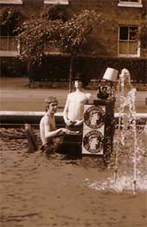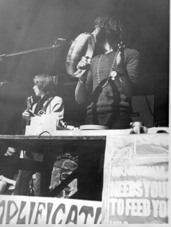Reviews, Articles & Links


IT Sept,12-25 1969 The first time I ever heard Bachdenkel, I was very disposed to not liking them as a matter of course. Their manager Karel Beer, was trying very hard to hustle them onto the bill of a Birmingham free concert I was instrumental in organising and it was a hot afternoon with about a dozen groups all wanting to make unscheduled appearances. I was not in the best of tempers. They went on last and stole the show. For those of us who were left. That was n the summer of 1968; they were a four-piece who had recently been a six-man soul-band called the Purists and they had suddenly decided that playing to pub-fulls of skin heads who got increasingly disinterested as they got increasingly inebriated, was not for them. Even last summer they displayed the characteristics of the complacent provincial groupster; their bass guitarist wore large, thick pullovers onstage and brought a flask of coffee and a packet of sandwiches to most gigs. “He was a necessary evil for a while”, explained Pete, vocalist and now also bass guitarist, "he owned half the equipment and so until we paid him off we had to keep him in the group". He was much happier playing soul for the PDMs though; PDM is part of the Bachdenkel language, a personal, highly insane narrative that they indulge in from time to time, it always seems to keep them happy when I, for instance, would be thoroughly pissed off. PDM means Park Drive and Mild drinkers, a section of the population against whom much of Bachdenkel's sarcasm is directed. At that time they were playing highly original, though very slightly drawn out, arrangements of some quite unlikely numbers like the Hollies "I Can't let Go' (still one of the greatest pop records ever made), and some of the later Beatle things. They approached their arrangements with little respect for anything but the quality of the basic melody. 'I Can't let Go', for instance, was executed much slower than the original with the 'hook' verse; About this time they sallied forth on a publicity campaign that I will always admire them for, simply because they really tried to get people interested in the group, not because they were a bunch of ego tripping adolescent schoolboy musicians but because they wanted people to hear their music, they also had a laugh doing it. What they did initially was to get themselves photographed in the middle of a fountain strewn pond outside one of the posher office blocks in Birmingham . The photo they liked best featured Pete playing a piano, smoking a cigar and wearing an incredible hat, all in the middle of this pool. They then had some very simple posters printed featuring the photo and they themselves screenprinted a border around the outside. In their huge yellow van they stole around town at the dead of night with a paste table set up in the back, opening the doors and rushing out with prepasted posters to be stuck on strategic sites. These included signposts, municipal toilets, department store widows, lamp posts; pillar-boxes, university notice boards, even stationary buses. It was beautiful and it worked. What happened was that Bachdenkel aroused enough interest to ensure that they gigged all the venues in Birmingham that were open to progressive bands, save Mothers. That meant all the university dances, a few of the halls of residence, the Midlands Arts Centre and the 'Strange Days' events run by the Birmingham Arts Lab Fund. After that they could go no further. It was almost as if most of these venues tolerated them because they felt obliged to, everyone was talking about their advertising exploits, the name couldn't be escaped from. Having 'done their duty', the colleges quickly forgot about them and returned to Orange Bicycle et al. By the winter of 68/69 the group were writing more of their own material, such as 'Oh Come All Ye Faceless', long, emotive, heavy songs that lingered long after they'd played them. Their arrangements got freakier, in that they became freer and less ordered and the empathy that they had developed with Fred Smith's Amoeba Light Show was incredible in its totality; I had seen nothing to beat it since I witnessed Mark Boyle working with the Soft Machine at 'Christmas on Earth Continued' at Olympia . It was the first integrated media show ever to regularly play the Midlands. For the Midlands it was just too good. Natch! About this time Bachdenkel were at their very best, as far as many people were concerned, but behind the music was a vague desperation. They were very broke, half their equipment had been taken away by the old bass player; they were borrowing vans that didn't work, living beyond their means in cold Edgbaston bed-sitters, hustling guitars on loan from the instrument shops and being turned down by all the two-bit lousy Brum agents who just weren't ready to accept something that had a hundred times more potential than the phony balderdash that they peddled to the pub promoters and the school dances. Yet they still had the charitable generosity to play free gigs for the Arts Lab Fund and anyone else who was involved in the same thing as them; trying to turn on the Midlands . It's to the eternal credit of Karel Beer that he kept it together during that cold negative winter. Karel Beer had studied in Paris, knew how to live there cheaply and had a few ideas about finding gigs. They scored their expenses, grooved with Fred's light show and stormed Paris, in a manner of speaking. They got plenty of gigs on the strength of their show at the Cité Universitaire. They also got offered a recording contract and met modern ballet dancer Graziela Martinez. Together with her they wrote a complete contemporary ballet choreographed by Graziela, music supplied by Bachdenkel and lit by Fred Smith. They played the American Centre for Artists & Students and were invited back to perform for a short season at a Paris theatre, which is where they are now, as far know. In between they came back to Britain together with Graziela to try and play the complete thing either in B’ham or London. Neither the ICA nor the Midlands Arts Centre (where they practiced relentlessly for months and played a few free gigs) would entertain the notion. They did about three or four gigs and dejectedly went back to France . It is incredible that a group of their inventiveness and talent, whose productivity has not been marred by their cruddy equipment and constant rejection by the Midlands Entertainment moguls, are as yet unrecognised in this country. Even if I didn't know them personally I would have been impressed by them; everyone whose judgment I respect has been knocked out by them (assuming they've seen them on a gig where their equipment has been steaming properly and the audience has been at least prepared to listen, for they've played quite a few bum gigs when things have been against them and why not?). Karel's a shrewd man though; he is not prepared to sign the band's lives away to some condescending London record company/agent just for the sake of it. He's seen it happen too many times. His concern for the band is sometimes taken for off-handedness by cynical big-timers and possibly he does over-do things from time to time. He wants to bring the band back to Britain only when people want to hear them for the music's sake. If he's got a solid foundation to fall back on in Paris he can afford to gamble now and again but that foundation's still being constructed. Ideally the band want to be in Britain , nobody likes having to live in a strange country to make one's bread but to come back to B’ham now would mean starving again. Birmingham ought to be eternally sorry that it largely ignored the hottest thing it ever had since Secunda developed the Move. And Bachdenkel are ten times better musically than any band ever to lurch forth down the M1, save possibly the Idle Race. But the big B are also into other scenes; multi-media presentations, operas, God alone knows what else. Why, I ask myself in slight disbelief, have they been ignored when groups whose names I suppose I'd better not mention, have had thousands of pounds spent on them by record companies who really ought to know better. Somehow, it doesn't even matter though. It must be worth it to them. Colin is a brilliant guitarist, Brian a compulsive, if not over technical, drummer and Pete a petulant bass player and intelligent singer. Together they obviously have a groove when they're working, which must make it worthwhile on one level at least. Their music is high, loud, flying, jarring, full, loose, tight, taut, intrinsically electric and ultimately Godly. If you ever get the chance to dig them on a good night, your head will fly. Spend a few hours with them and they suddenly become Rory O'Toole and the Spall Peens Showband - a group well known in the pubs and working mens clubs of the Central Midlands, dedicated to drying up the Guinness supplies of the country, rigidly maintaining a plentiful supply of 'Hucklebuck Shoes' and 'Twist and Shout' (yes, they still play that in Birmingham's three Irish clubs), causing minor riots in the all-night Curry Cafes, spending Sunday lunchtimes in an orgy of Park Drives, Mild Ale and vomiting in the streets and beating all 'ippies, blues groups and hairy people into a glutinous pulp. The banter they indulge in which perpetrated this illusion, is funnier than the Beatles' applied Liverpool charm ever was. One long piss take. I don't really know why they do it. The reasons can't really be evaluated with pretentious psychological terminology: they just do it, it takes your mind off the weird situation they're in and it maybe takes their minds off it too. It's also a groove. I hope you meet them, I really do, they're surprisingly gentle people underneath it all. (NB. Because Bachdenkel are still in Paris, it was impossible to conduct an up to date interview which could be quoted from. The facts and attitudes mentioned herein are therefore taken from personal knowledge of the group over the last eighteen months and are as correct as possible. Any inaccuracies are regretted and hereby apologised for.) Mark Williams |

Mark is playing the tamborine
The tamborine belonged to Family and ended up in Paris.